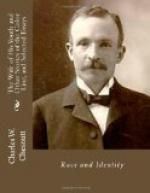Before the chancel, on trestles draped in black, stood the sombre casket in which lay all that was mortal of her dear teacher. The top of the casket was covered with flowers; and lying stretched out underneath it she saw Miss Myrover’s little white dog, Prince. He had followed the body to the church, and, slipping in unnoticed among the mourners, had taken his place, from which no one had the heart to remove him.
The white-robed rector read the solemn service for the dead, and then delivered a brief address, in which he dwelt upon the uncertainty of life, and, to the believer, the certain blessedness of eternity. He spoke of Miss Myrover’s kindly spirit, and, as an illustration of her love and self-sacrifice for others, referred to her labors as a teacher of the poor ignorant negroes who had been placed in their midst by an all-wise Providence, and whom it was their duty to guide and direct in the station in which God had put them. Then the organ pealed, a prayer was said, and the long cortege moved from the church to the cemetery, about half a mile away, where the body was to be interred.
When the services were over, Sophy sprang down from her perch, and, taking her flowers, followed the procession. She did not walk with the rest, but at a proper and respectful distance from the last mourner. No one noticed the little black girl with the bunch of yellow flowers, or thought of her as interested in the funeral.
The cortege reached the cemetery and filed slowly through the gate; but Sophy stood outside, looking at a small sign in white letters on a black background:——
“Notice. This cemetery is for white people only. Others please keep out.”
Sophy, thanks to Miss Myrover’s painstaking instruction, could read this sign very distinctly. In fact, she had often read it before. For Sophy was a child who loved beauty, in a blind, groping sort of way, and had sometimes stood by the fence of the cemetery and looked through at the green mounds and shaded walks and blooming flowers within, and wished that she might walk among them. She knew, too, that the little sign on the gate, though so courteously worded, was no mere formality; for she had heard how a colored man, who had wandered into the cemetery on a hot night and fallen asleep on the flat top of a tomb, had been arrested as a vagrant and fined five dollars, which he had worked out on the streets, with a ball-and-chain attachment, at twenty-five cents a day. Since that time the cemetery gate had been locked at night.
So Sophy stayed outside, and looked through the fence. Her poor bouquet had begun to droop by this time, and the yellow ribbon had lost some of its freshness. Sophy could see the rector standing by the grave, the mourners gathered round; she could faintly distinguish the solemn words with which ashes were committed to ashes, and dust to dust. She heard the hollow thud of the earth falling on the coffin; and she leaned against the iron fence, sobbing softly, until the grave was filled and rounded off, and the wreaths and other floral pieces were disposed upon it. When the mourners began to move toward the gate, Sophy walked slowly down the street, in a direction opposite to that taken by most of the people who came out.




